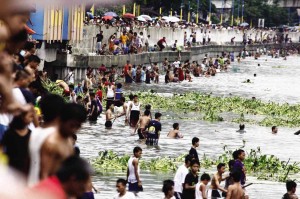
Mandaluyong City residents flock to the riverbanks as news of an easy catch spread Thursday. The Bureau of Fisheries and Aquatic Resources (BFAR) has warned of a possible shortage of fish products, if the catching of fish uncaged during the onslaught of typhoon “Glenda” (Rammasun) is left uncontrolled. JOAN BONDOC
MANILA, Philippines–The Bureau of Fisheries and Aquatic Resources (BFAR) has warned of a possible shortage of fish products, if the catching of fish uncaged during the onslaught of typhoon “Glenda” (Rammasun) is left uncontrolled.
BFAR director Asis G. Perez called on concerned local governments around Laguna de Bay and Taal Lake as well as fishers and the general public, on Monday, to take only what they need and let some of the fish go.
Perez said Glenda ravaged hundreds of hectares of fish ponds, cages and pens in both lakes, which released tons of milkfish, tilapia and carp.
“This resulted in the sudden increase in the catch of local fishers and the supply of fish in the markets of Metro Manila and adjacent provinces,” the BFAR chief said.
“Because of the excess supply, prices plunged to almost nothing,” he added.
To make matters worse, Perez said the concurrent problems in power service interruptions led to problems in sourcing ice for sellers and refrigeration for consumers left much of the fishes spoiled.
“We appeal to the LGUs to help address the wasteful catching of the fishes,” Perez said. “Of course, the uncaged fish belong to the public now, but there must be a measure of control.”
He said it would be more beneficial to all concerned if some of the uncaged fishes be made to serve as buffer stock that would ensure enough harvest in the future.
“Refraining from uncontrolled catching will also help temper an eventual price spike which usually happens several weeks after a strong storm, especially in the affected areas,” Perez added.
Based on monitoring by the Department of Agriculture (DA), the fisheries sector showed the biggest damage in the wake of Glenda.
In the first two days after the typhoon, the DA’s field operations service pegged fisheries damage at some P800 million.
The amount was close to one-third of total agricultural damage that was estimated at about P2.9 billion as of the weekend.